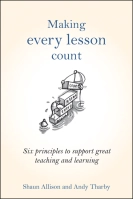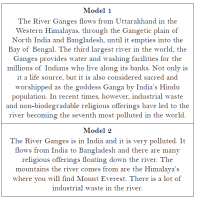 Regular readers of this blog will know about the ‘bright spots’ that I share. This involves me walking around the school and writing about the great teaching that I see – they can be read here. In response to the Sutton Trust report ‘What makes great teaching?’ placing subject knowledge as one of the key factors associated with great teaching, this year as a school we want to focus more on subject specific CPD. In response to this, a number of subjects are setting up ‘Subject 15 Minute Forums’, where staff will share how they teach a particularly tricky topic and address misconceptions students might have. On Monday, science teacher Bex Owen is kicking this off in the science department with a forum on teaching energy – I’m very much looking forward to this.
Regular readers of this blog will know about the ‘bright spots’ that I share. This involves me walking around the school and writing about the great teaching that I see – they can be read here. In response to the Sutton Trust report ‘What makes great teaching?’ placing subject knowledge as one of the key factors associated with great teaching, this year as a school we want to focus more on subject specific CPD. In response to this, a number of subjects are setting up ‘Subject 15 Minute Forums’, where staff will share how they teach a particularly tricky topic and address misconceptions students might have. On Monday, science teacher Bex Owen is kicking this off in the science department with a forum on teaching energy – I’m very much looking forward to this.
Another initiative that has sprung up in response to this is ‘magpie observations’. In the spirit of collaboration and sharing good practice, pairs of teachers walk around their subject area, going into classrooms and spotting the great things that the teachers and students are doing – and then sharing it. So far, this has already taken place in science and humanities and is due to happen in maths next week.
Director of Science Steph Temple and Deputy Leader Simona Trignano did the first round of magpie observations this week. Every science teacher has then been paired up with a colleague, to do the same throughout the year – so everybody is involved and gets to celebrate the successes of their colleagues. A great model of subject specific CPD. This is what Steph and Simona found:
- Quality of work in books demonstrates high expectations within science. Students clearly showing they are now taking more pride in their work- even students who in the past may not have cared that much about what their books looked like.
- Use of colours and highlighters to emphasise key points and highlight weaker areas shown in their books.
- Wonderful relationships shown already and enthusiasm in the subject knowledge. Staff genuinely enjoying teaching and science.
- Use of a visual starter/learning hook so students settled quickly. Then paired discussion was used to identify conduction in different materials.
- Growth- mindset language used with students to encourage them. “even if wrong” “You might not know this YET” “it might be a struggle, buts that’s okay”
- Students encouraged to review learning from previous lessons, using their well-kept books as a resource/revision tool.
- Clear modelling of how to structure longer answers using similarities and differences table. This helped to understand isotopes.
- Encouraging students to use the correct scientific language and challenged when not correct. This was shown through scaffolding questioning, or asking the class as a whole “is that the right term?”
- High expectations and challenge where seen for students-with a lower starting point – good presentation of work continually encouraged.
- Staff giving verbal feedback to students and rotating around groups supporting them.
- Live marking of students’ work- posing probing questions in their books and asking students to respond to feedback.
- Great awareness of challenge by pre-planning extension tasks. Students who had finished the starter where expected to start the extension. This meant there was no dead time in the lesson and all students were challenged.
- Calm use of voice and body language to manage a safety demonstration. Clear routines established in so few lessons.
Director of Humanities, Martyn Simmonds, has done the same:
Geography
- Clear expectations were being set by teachers for both year 7 and 8 pupils.
- Clear evidence of challenge being set for year 7 and 8 pupils.
- Activities which involved decision-making and justification skills forced the students to consider their opinions clearly.
- Lots of pupil involvement particularly around discussions faced on challenging questions such as ‘Could we live without energy?’
- Evidence that misconceptions were being challenged immediately and that pupils were being encouraged to use the correct terminology rather than a ‘watered down’ version.
History
- Excellent questioning technique within History lessons, which probed students’ initial answers and elicited further information.
- Clear development of key skills in year 8 lessons, particularly source analysis skills. Students were taken through how to analyse a source and what key elements to identify/look out for.
- Year 11 pupils were continuing to develop their source analysis skills using challenging sources and being forced to look at a source from a different perspective such as ‘who’ published the source rather than the more common approach of ‘why’ the source was published.
- Excellent explanation from teachers at GCSE level to develop pupils’ understanding and highlight how they can obtain marks in the exam.
- Creating a ‘keywords’ section at the back of pupils’ books to form a mini-dictionary which could be used throughout the year.
Social & Moral Education (SME)
- All SME lessons were highlighting the expectations of pupils and the importance of being able to share ideas and opinions.
- Teachers were passionate about the subject and stressing the importance of SME as a subject to the pupils.
- Lots of student involvement in discussions and willing to share answers or ideas.
- Lots of clear ‘icebreaker’ activities designed to make pupils feel comfortable within their SME classroom.
Whilst generic CPD has a place in schools, this is already beginning to highlight the importance of taking CPD down to the subject level. It provides teachers with the answer to that very important question – ‘What can I do to make my teaching of this topic more effective?’
We are looking forward to developing this approach further as the year goes on.












